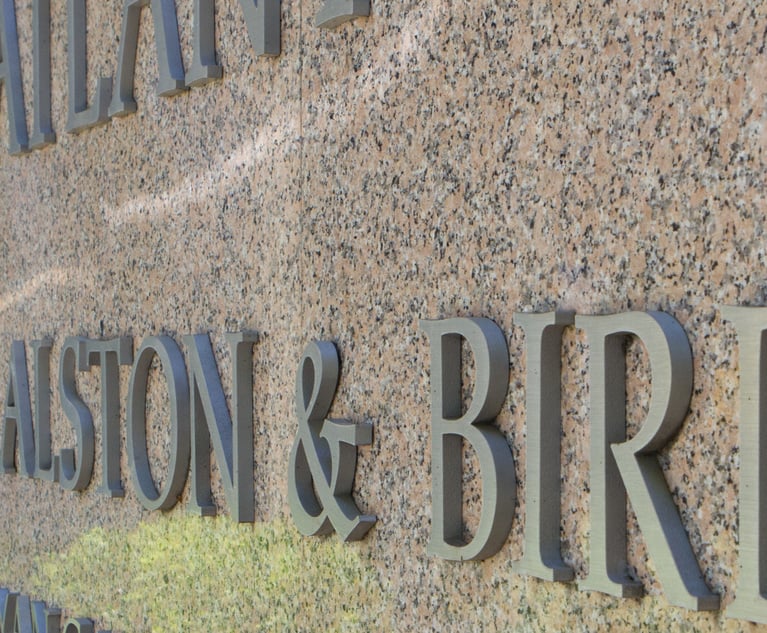 Shari Klevens (left) and Alanna Clair, Dentons. (Courtesy photo)
Shari Klevens (left) and Alanna Clair, Dentons. (Courtesy photo)The Seven Deadly Sins of Lawyers, #3: Lust
Notably, this is not an issue that can generally be solved by obtaining informed consent.
February 04, 2019 at 12:23 PM
6 minute read
In this third part of our series about lawyers' “Seven Deadly Sins,” we address the professional risks that can arise from “lust.”
Attorneys enjoy special relationships with clients, given attorneys' knowledge of their clients' secrets and confidences. To that end, there are numerous bar rules and ethical opinions governing how important it is that an attorney takes care not to violate their clients' trust by doing things that could be conceived of as taking advantage of the unique position of trust the attorney enjoys.
Although sometimes such issues arise in the matter of conflicts or the management of trust accounts, there is another topic on which an attorney can be viewed as violating the position of trust: by beginning a personal romantic relationship with a client.
Here are some tips for how attorneys can avoid their “lust” creating ethical issues for them in their relationships with clients.
The Rules Can Be Strict
Some law firms ban personal or sexual relationships between attorneys and clients. However, even for those firms that do not specifically legislate that conduct, many bars have developed rules specifically targeted at limiting attorneys and clients engaging in intimate relationships.
Indeed, Model Rule 1.8(j) of the ABA's Model Rules of Professional Conduct provides, “A lawyer shall not have sexual relations with a client unless a consensual sexual relationship existed between them when the client-lawyer relationship commenced.” The comments to the rule provide additional insight on why such a ban is contained in the ABA's model rules.
Comment [17] to Model Rule 1.8 confirms that the purpose of the rule is based in the fiduciary relationship between attorneys and clients: “The relationship is almost always unequal; thus, a sexual relationship between lawyer and client can involve unfair exploitation of the lawyer's fiduciary role, in violation of the lawyer's basic ethical obligation not to use the trust of the client to the client's disadvantage. In addition, such a relationship presents a significant danger that, because of the lawyer's emotional involvement, the lawyer will be unable to represent the client without impairment of the exercise of independent professional judgment. Moreover, a blurred line between the professional and personal relationships may make it difficult to predict to what extent client confidences will be protected by the attorney-client evidentiary privilege, since client confidences are protected by privilege only when they are imparted in the context of the client-lawyer relationship.”
Similarly, California's Rule of Professional Conduct 1.8.10 bans “sexual relations with a current client who is not the lawyer's spouse or registered domestic partner.” The Business & Professions Code in California goes even further, banning an attorney's use of “coercion, intimidation, or undue influence in entering into sexual relations with a client.”
Notably, this is not an issue that can generally be solved by obtaining informed consent. Comment [17] to Model Rule 1.8 provides that “[b]ecause of the significant danger of harm to client interests and because the client's own emotional involvement renders it unlikely that the client could give adequate informed consent, this Rule prohibits the lawyer from having sexual relations with a client regardless of whether the relationship is consensual and regardless of the absence of prejudice to the client.”
Where the client is a corporate entity, Comment [19] notes that Model Rule 1.8(j) prohibits sexual relationships between a lawyer and “a constituent of the organization who supervises, directs or regularly consults with that lawyer concerning the organization's legal matters.”
Attorneys Are Generally Permitted to Represent Existing Spouses or Partners
Most rules addressing this issue are clear that there is no prohibition against a lawyer representing an existing spouse or partner because in those instances, the personal relationship predates the professional representation.
Consequently, attorneys and their firms routinely prepare wills for spouses, defend companies owned by domestic partners and otherwise represent or advise others with whom they have an ongoing intimate relationship. The rules are generally not aimed at such situations but rather are concerned that a sexual relationship that begins after the attorney-client relationship could impact the attorney's ability to provide fair representation.
Comment [18] to Model Rule 1.8 confirms that “[i]ssues relating to the exploitation of the fiduciary relationship and client dependency are diminished when the sexual relationship existed prior to the commencement of the client-lawyer relationship.” However, the comments additionally recommend that, for those instances in which a lawyer is going to provide legal representation to a spouse or longtime partner, “the lawyer should consider whether the lawyer's ability to represent the client will be materially limited by the relationship.”
Sexual Relationships That Begin After the Attorney-Client Relationship Has Commenced Can Present Risk
Beginning a sexual relationship with a client after the representation has commenced can present significant risk.
There are numerous shocking stories about attorneys being sanctioned for their personal relationships with clients that include more abhorrent examples of an attorney trading on a client's vulnerable state. However, even in more innocuous relationships that do not condition the performance of legal services on the performance of sexual favors, it can be difficult to defend the attorney's decision to enter into a romantic relationship with a client if either relationship—professional or personal—falls apart. There may still be a presumption that the attorney took advantage of the special trust and confidence of a vulnerable client or that the attorney was more influenced by personal desires than professional judgment in recommending certain courses of action.
If an intimate relationship develops between an attorney and client, most attorneys will terminate the representation to ensure that the personal relationship can continue without the appearance of impropriety.
By being aware of the limitations on appropriate conduct, attorneys can avoid having their “lust” leading to a bar complaint or other adverse action.
Shari L. Klevens is a partner at Dentons US in Atlanta and Washington, D.C., and serves on the firm's U.S. board of directors. She represents and advises lawyers and insurers on complex claims and is co-chair of Dentons' global insurance sector team.
Alanna Clair, also a partner at Dentons US in Washington, focuses on professional liability and insurance defense. Klevens and Clair are co-authors of “The Lawyer's Handbook: Ethics Compliance and Claim Avoidance” and the upcoming 2019 edition of “Georgia Legal Malpractice Law.”
Related Stories
This content has been archived. It is available through our partners, LexisNexis® and Bloomberg Law.
To view this content, please continue to their sites.
Not a Lexis Subscriber?
Subscribe Now
Not a Bloomberg Law Subscriber?
Subscribe Now
NOT FOR REPRINT
© 2025 ALM Global, LLC, All Rights Reserved. Request academic re-use from www.copyright.com. All other uses, submit a request to [email protected]. For more information visit Asset & Logo Licensing.
You Might Like
View All
On the Move: Freeman Mathis & Gary Promotes 16 to Partner, Expands to Denver
5 minute read

Georgia Supreme Court Honoring Troutman Pepper Partner, Former Chief Justice
2 minute read
Trending Stories
- 1Freshfields Name Change Becomes Official
- 2Lawyers on TikTok Seek the Right Mix of Substance and Levity
- 3Chair of Montgomery McCracken Decamps for Morgan Lewis
- 4You Too Can Be a Programmer: Connecting to Legal Platform APIs With Generative AI (Part 2)
- 5Court of Appeals and Appellate Division As Courts of First Instance
Who Got The Work
Michael G. Bongiorno, Andrew Scott Dulberg and Elizabeth E. Driscoll from Wilmer Cutler Pickering Hale and Dorr have stepped in to represent Symbotic Inc., an A.I.-enabled technology platform that focuses on increasing supply chain efficiency, and other defendants in a pending shareholder derivative lawsuit. The case, filed Oct. 2 in Massachusetts District Court by the Brown Law Firm on behalf of Stephen Austen, accuses certain officers and directors of misleading investors in regard to Symbotic's potential for margin growth by failing to disclose that the company was not equipped to timely deploy its systems or manage expenses through project delays. The case, assigned to U.S. District Judge Nathaniel M. Gorton, is 1:24-cv-12522, Austen v. Cohen et al.
Who Got The Work
Edmund Polubinski and Marie Killmond of Davis Polk & Wardwell have entered appearances for data platform software development company MongoDB and other defendants in a pending shareholder derivative lawsuit. The action, filed Oct. 7 in New York Southern District Court by the Brown Law Firm, accuses the company's directors and/or officers of falsely expressing confidence in the company’s restructuring of its sales incentive plan and downplaying the severity of decreases in its upfront commitments. The case is 1:24-cv-07594, Roy v. Ittycheria et al.
Who Got The Work
Amy O. Bruchs and Kurt F. Ellison of Michael Best & Friedrich have entered appearances for Epic Systems Corp. in a pending employment discrimination lawsuit. The suit was filed Sept. 7 in Wisconsin Western District Court by Levine Eisberner LLC and Siri & Glimstad on behalf of a project manager who claims that he was wrongfully terminated after applying for a religious exemption to the defendant's COVID-19 vaccine mandate. The case, assigned to U.S. Magistrate Judge Anita Marie Boor, is 3:24-cv-00630, Secker, Nathan v. Epic Systems Corporation.
Who Got The Work
David X. Sullivan, Thomas J. Finn and Gregory A. Hall from McCarter & English have entered appearances for Sunrun Installation Services in a pending civil rights lawsuit. The complaint was filed Sept. 4 in Connecticut District Court by attorney Robert M. Berke on behalf of former employee George Edward Steins, who was arrested and charged with employing an unregistered home improvement salesperson. The complaint alleges that had Sunrun informed the Connecticut Department of Consumer Protection that the plaintiff's employment had ended in 2017 and that he no longer held Sunrun's home improvement contractor license, he would not have been hit with charges, which were dismissed in May 2024. The case, assigned to U.S. District Judge Jeffrey A. Meyer, is 3:24-cv-01423, Steins v. Sunrun, Inc. et al.
Who Got The Work
Greenberg Traurig shareholder Joshua L. Raskin has entered an appearance for boohoo.com UK Ltd. in a pending patent infringement lawsuit. The suit, filed Sept. 3 in Texas Eastern District Court by Rozier Hardt McDonough on behalf of Alto Dynamics, asserts five patents related to an online shopping platform. The case, assigned to U.S. District Judge Rodney Gilstrap, is 2:24-cv-00719, Alto Dynamics, LLC v. boohoo.com UK Limited.
Featured Firms
Law Offices of Gary Martin Hays & Associates, P.C.
(470) 294-1674
Law Offices of Mark E. Salomone
(857) 444-6468
Smith & Hassler
(713) 739-1250






